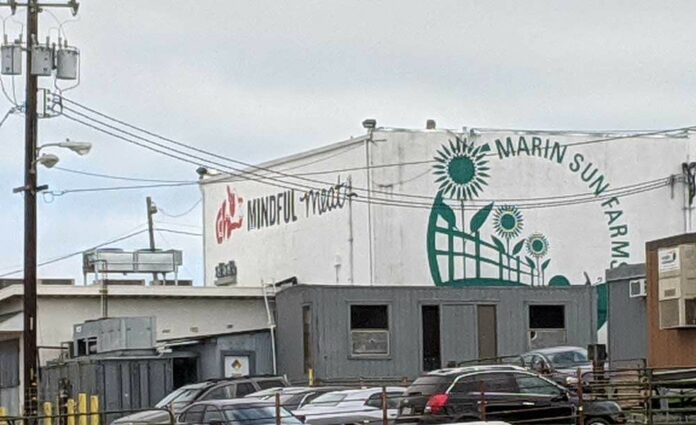North Bay ranchers face a new challenge after the owner of the region’s last slaughterhouse announced last year that it will no longer process meat from small, independent producers.
The news comes five years after a Marin County rancher, backed with investment from a Silicon Valley businessman, saved the slaughterhouse from closing.
In February 2014, the United States Department of Agriculture (USDA) announced a recall of 8.7 million pounds of meat processed at a Petaluma slaughterhouse owned and operated by Rancho Feeding Corporation over the previous year.
“[Rancho] processed diseased and unsound animals and carried out these activities without the benefit or full benefit of federal inspection,” a USDA press release from the time states.
The news hit the local food community hard. After decades of consolidation within the meat-processing industry, Rancho operated the last USDA-approved slaughterhouse in the Bay Area, a wealthy region full of health-food fanatics.
In a March 1, 2014 New York Times opinion piece, Nicolette Hahn Niman, the co-owner of Niman Ranch, explained some of the inter-related problems facing the industry.
“From 1979 to 2009, California went from having 70 slaughterhouses to 23,” Niman wrote. “Because it is more complicated and costly to do so, nearly all large facilities refuse to work with smaller farms. This makes slaughtering the most serious bottleneck in the sustainable food chain.”
Shortly after the USDA’s recall announcement, David Evans, the owner of Marin Sun Farms, swooped in to save the slaughterhouse from closure. According to press coverage from the time, Marin Sun Farms received financial backing from Ali Partovi, a Silicon Valley interest who had taken an interest in local agriculture several years earlier.
In April 2011, Patrovi wrote an article for TechCrunch laying out his thoughts on the organic food industry titled “Food Is The New Frontier In Green Tech.”
“Like energy, food and agriculture are big, slow, and highly regulated sectors,” Partovi wrote. “But also like renewable energy, there might be opportunities for innovation and profit in ‘renewable food,’ fueled by consumer preference today and by shifts in policy tomorrow.”
Between 1990 and 2009, the organic-food market in the U.S. grew from $1 billion to $25 billion, Partovi noted in the article.
“The biggest obstacle impeding Marin Sun Farms’ growth today is inadequate capital,” Partovi wrote. “It cannot secure land, water, and animals fast enough to meet the growing demand. This dynamic reminds me of the early days of [the online shoe sales company] Zappos, when Tony Hsieh was desperately seeking capital to secure shoes fast enough to meet the growing demand.”
For almost five years, Marin Sun Farms continued to serve small producers as promised. But last fall, Evans informed independent producers that the slaughterhouse would no longer be able to serve them.
In November, Claire Herminjard, Evans’ wife and business partner, told the Petaluma Argus-Courier that the cannabis industry has caused the company’s labor costs to increase.
Sarah Silva, farm manager at Petaluma’s Green Star Farms, which produces eggs, chickens, pigs, lambs and more, says Marin Sun Farms’ announcement reinvigorated a conversation about finding an alternative solution for small-scale, USDA-approved meat processing.
“This might be a blessing in disguise,” she told the Bohemian.
Silva, the farm manager, says the multifaceted problems facing the local producers are in large part due to an industrial agriculture which has led consumers to expect cheap meat, even if the process used to grow it is environmentally destructive.
The lack of a local slaughterhouse creates yet another problem. Even if producers raise and market their animals in the North Bay, most now need to transport their animals long distances for processing.
Silva says she now has to process a large number of animals once every few months at a distant facility rather than once every few weeks as she did at Marin Sun Farms. That means she has to store large amounts of meat for longer periods of time.
In late January, Silva stopped selling meat at local farmers markets in part because she now spends more time transporting animals for processing. Instead, she has turned towards a community-supported agriculture (CSA) model in which customers subscribe to monthly distributions of food.
While that’s not as convenient for Green Star’s customers, it is now a necessity, Silva says.
Within the agriculture community there is talk of setting up a mobile meat-processing operation. While discussions are in the early stages, there is more momentum than Silva has seen in her 12 years in the local farming community.
Although other communities have set up mobile-processing operations and the USDA seems increasingly receptive to the idea, the local discussions are still in the early phases and ranchers impacted by Marin Sun Farms’ decision are still busy managing their day-to-day operations, Silva says.
To succeed, the group of ranchers will need approval from a variety of regulatory bodies, including the USDA and North Coast Regional Water Quality Control Board.
A USDA inspector would accompany the mobile unit and inspect animals before, during and after the slaughter, according to Karen Giovannini, the Agricultural Ombudsman at the Sonoma County University of California Cooperative Extension who is looking into the laws governing mobile slaughterhouses, a few of which already exist on the West Coast.
“Up until recently, most of the animals [raised on small farms in Sonoma County] never left the county,” Giovannini says.
Because they are relatively cost efficient and save ranchers the trouble of shipping their animals long distances for slaughter, mobile-processing units could be the wave of the future.









